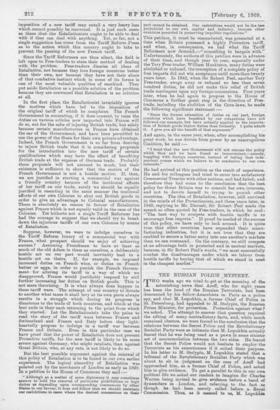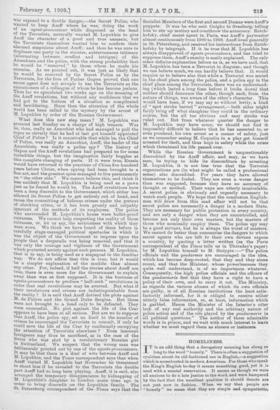THE RUSSIAN POLICE MYSTERY. T WO weeks ago we tried to
get at the meaning of the astonishing news that Azeff, who for eight years has been the head of the Russian Terrorists, had been denounced by his fellow-Anarchists in Paris as a police spy, and that M. Lopukhin, a. former Chief of Police in St. Petersburg, had appealed to M. Stolypin, the Russian Prime Minister, for protection. Protection against what? we asked. The attempt to answer that question required the sifting of many contradictory facts, and, while much remained obscure, we were forced to the conclusion that the relations between the Secret Police and the Revolutionary Socialist Party were so intimate that M. Lopukhin actually feared that he was being used as a pawn in some sinister act of accommodation between the two sides. He feared that the Secret Police would not heeitate to employ the Terrorists as his executioners if it suited their purpose. In his letter to M. Stolypiu, M. Lopukhin stated that a tribunal of the Revolutionary Socialist Party which was about to sit in judgment on the case of Azeff had approached hire, as a former Chief of Police, and asked him to give evidence. To get a parallel to this in our own political life we asked our readers to imagine Sir Charles Warren being invited to give evidence before a band of dynamiters in London, and referring to the fact as though he had been merely called before a, , Royal Commission. Thus, as it seemed to us, M. Lopukhia was exposed to a double danger,—the Secret Police, who wanted to keep Azeff where he was doing the work of an agent-provocateur while disguised as the head of the Terrorists, naturally wanted M. Lopukhin to give Azar the character of a good and true assassin, but the Terrorists themselves wanted him to confine their alarmed suspieions about Azeff ; and thus he was sure to displease one party in the sinister, subterraneous intimacy (alternating between conflict and intrigue) of the Anarchists and the police, with the strong probability that be would be " removed " by those whom be made his enemies. As we pointed out, it was just as likely that he would be removed by the Secret Police as by the Terrorists, for the fate of Father Gapon proved that one secret agent does not scruple to use the Terrorists as the executioners of a colleague of whom he has become jealous. Thus far we speculated two weeks ago on the meaning of the Azeff revelations, but without any confidence that we bad got to the bottom of a situation BO complicated and bewildering. Since then the attention of the whole world has been called to the mystery by the arrest of M. Lopukhin by order of the Russian Government.
What does this new step mean ? M. Lopukhin was arrested last Sunday on a charge of high treason. Was he, then, really an Anarchist who had managed to pull the ropes so cleverly that he had at last got himself appointed Chief of Police ? Is it conceivable that while he, the Chief of Police, was really an Anarchist, Azeff, the leader of the Anarchists, was really a police spy ? The history of Ga,pon and the Azeff revelations had prepared us for some incredible things, but the imagination fairly boggles at this complete changing of parts. If it were true, Russia would have returned to the practices of China five hundred years before Christ, when spying had been brought to a fine art, and the greatest spies managed to live permanently on "the other side." We cannot believe this, and think it less unlikely that M. Lopukhin is being used as a pawn just as he feared be would be. The Azeff revelations have been a deep discredit to the Government, which either has allowed its Secret Police to get entirely out of band, and cause the committing of hideous crimes under the pretext of checking crime, or it has been grossly and culpably ignorant of the methods of its employees. The police who surrounded M. Lopukhin's house wore bullet-proof cuirasses. We cannot help suspecting the reality of those Cuirasses, or, let us say, the seriousness with which they were worn. We think we have heard of them before in carefully stage-managed political spectacles in which it was the object of the Government to impress upon the People that a desperado was being removed, and that it was only the courage and vigilance of the Government which protected society against such persons. M. Lopukhin, that is to say, is being used as a scapegoat in the familiar way. We do not affirm that this is true, but it would be a simpler explanation of the muddle than almost any other. For, indeed, if half the stories about Azeff are true, there is even more for the Government to explain away than was at first supposed. It is the business of agents-provocateurs to produce " half-cock " revolutions in order that real revolutions may be averted. But what if their revolutions and crimes are indistinguishable from the reality ? It is said that Azeff devised the plots against M. de Plelive and the Grand Duke Sergius. But these were not brought to a head only to be defeated. They were successful. No plot against the life of the Czar appears to have been at all serious. But are we to suppose that Azeff, the police spy, set no limit to the number of crimes he encouraged the Terrorists to commit, if only he could save the life of the Czar by continually occupying the attention of Terrorists elsewhere ? Even innocent foreigners may thus be sacrificed, as in the case of the Swiss who was shot by a revolutionary Russian girl in Switzerland. We suspect that the wrong man was deliberately pointed out by one of the agents-provocateurs. It may be that there is a duel of wits between Azeff and M. Lopukhin, and the Times correspondent says that when Azeff visited M. Lopukhin last November he threatened to shoot him if he revealed to the Terrorists the double part Azeff had so long been playing. Azeff, it is said, also arranged the temporary disappearance by kidnapping of M. Lopukhin's daughter in London some time ago in order to bring discredit on the Lopukhin family. The St. Petersburg correspondent of the Times says that the Socialist Members of the first and second Dumas were Azeff's puppets. It was be who sent Ouipko to Sveaborg, telling him to stir up mutiny and overthrow the autocracy. Ratch- kofsky, chief secret agent in Paris, was Azeff's paymaster almost continuously from 1900 to 1908. Azeff lived 'generally in St. Petersburg, and received his instructions from Retch- kofsky by telegraph. If it be true that M. Lopukhin has always disapproved of agents-provocateurs, and has tried to suppress them, Azeff's enmity is easily explained. The only other definite explanation before us is, as we have said, that M. Lopukhin has been a Terrorist in disguise; and though we can believe much, we can hardly believe that. It would require us to believe also that while a Terrorist was seated in the chief place among the police, and a police spy in the chief place among the Terrorists, there was an understand- ing (which lasted a long time before it broke down) that neither should denounce the other, though each, from the nature of things, was aware of the other's character. This would have been, if we may say so without levity, a kind of "spot stroke barred" arrangement,—both sides might fairly bring off what slaughter they could in the ordinary course, but the all too obvious and easy stroke was ruled out. But from whatever quarter the danger to M. Lopukhin may have come, we should not find it impossibly difficult to believe that he has assented to, or even procured, his own arrest as a means of safety, just as we remember seeing M. Coquelin in a play get himself arrested for theft, and thus kept in safety while the crisis which threatened his life passed over.
While the Russian Government is unquestionably discredited by the Azeff affair, and may, as we have seen, be trying to hide its discomfiture by arresting M. Lopukhin, it is not less true that the Terrorist organisations are (in what might be called a professional sense) also discredited. For years they have allowed themselves to be fooled. They are even a worse danger than was supposed, because they have no accuracy of thought or method. Their ways are utterly incalculable. A secret police is obviously and urgently necessary to watch such people. We hope that the conclusion English- men will draw from this mad affair will not be that secret police are necessarily a danger in a modern State. They are necessary for public protection in every country, and are only a danger when they are uncontrolled, and become not only their own masters, but the masters of those who nominally employ them. The police spy may be a good servant, but he is always the worst of masters. We cannot do better than summarise the dangers to which secret agents who are left to their own devices expose a country, by quoting a letter written (as the Paris correspondent of the Times tells us in Thursday's paper) by M. Lopukhin himself to M. Stolypin :—" The police officials and the gendarmes are encouraged in the idea, which has become deep-rooted, that they and they alone count, and that the Minister, whose powerlessness they quite well understand, is of no importance whatever. Consequently, the high police officials and the officers of the gendarmerie feel that they have a right to have a policy of their own, and to carry it out. The Ministry, as regards the various abuses of which its own officials are guilty, is of all Russian institutions the least satis- factorily informed, fur it is obliged to receive either utterly false information, or, at least, information which is garbled. Hence the Minister of the Interior's utter lack of any real authority and the arbitrary nature of police action and of the role played by the gendarmerie in all political questions." The author of these admirable words is in prison, and we wait with much interest to learn whether we must regard them as sincere or insincere.










































 Previous page
Previous page